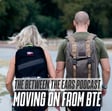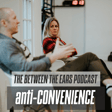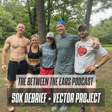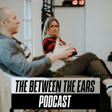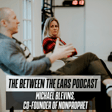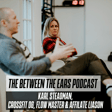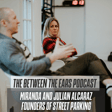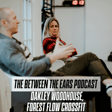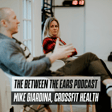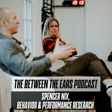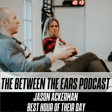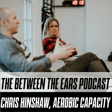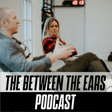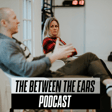Become a Creator today!Start creating today - Share your story with the world!
Start for free
00:00:00
00:00:01

Why We Do Hard Things
K and I discuss her recent event, the Frogman 5k swim for Team Step-Up Foundation benefiting the Navy SEAL Foundation. We dive into the meaning of this event providing a source of fuel to drive through the doubt and uncertainty, the inherent value of doing hard stuff and the concept of misogi, and what lies ahead for us in this pursuit.
Support the showTranscript
The Humor of a Greeting
00:00:01
Speaker
Hello. Hello. You always, it's so funny. You have this little smirk after you say hello. Like it's like every time as if it's the first time you've ever heard it. Well, I dunno. I dunno. Okay. Here we are.
Pandemic Living Room Nostalgia
00:00:24
Speaker
back in the old living room. This is like the pandemic days. Yeah. The internet started in the basement, started in the basement, now we're in the living room. Oh yeah, we were in the basement. Another year we'll be in the attic. Um, well, what are we chatting about today?
Frogman 5K: Historical Context
00:00:45
Speaker
So you just last weekend did the
00:00:50
Speaker
Uh, frog man, five K swim in the Boston, inner harbor, Boston harbor. Where did they throw the tea? That was in that harbor. I feel like I didn't see anything about that. You know what I mean? Like a sign, like, yeah. Like here's where we fucked up the Brits tea. No, there should have been. There was no, I don't know.
Why Join Frogman?
00:01:13
Speaker
Anyway, you swam a five K. Yeah. So it was, this is an annual,
00:01:20
Speaker
event. I mean, they also do it in Tampa Bay. I'm not super familiar with all the details of the Frogman, but apparently this was the fourth year in Boston. I did actually meet the man who started it, basically kind of cool story. He mentored this kid. Yeah, I want to get into that, but
00:01:44
Speaker
Yeah, anyway, so this swim last year when I was finishing up or had just finished my Ironman.
00:01:53
Speaker
It was kind of timing and different things. I had seen this go on last year. And then I was doing Iron Man. And I thought it was just obviously an amazing way to support our friend Sarah. And it was a great fundraiser. And then after Iron Man, I thought I'd be down to do some kind of swimming event.
00:02:17
Speaker
Yeah. I remember you looked into. Oh yeah. I was like talking about like a six mile swim. Oh my God. Really? Yeah. I remember you. I wanted to do a long swim. A marathon swim. Well, not a marathon swim. But isn't that what it's called? I guess marathon swim is technically, it could be anything from like, I think six miles to whatever, but there are people that do like 26 miles. But because I had really enjoyed swimming, I felt like it wasn't,
00:02:48
Speaker
It's not really as hard on your body. I thought, well, I'll just roll right into a swimming event. Since you already had all of this swimming fitness. Yeah. And that was really the most enjoyable part of the Iron Man. And then, yeah, the opportunity to be on, Sarah was creating a team, Sarah Wilkinson.
Swimming for a Cause
00:03:08
Speaker
So she sort of stepped up this year's
00:03:14
Speaker
participation, and literally her organization is the Step Up Foundation, and put together a team. So there were a couple of people that had already done this in conjunction with the Step Up Foundation last year, but now we had a team of 10. I'm not entirely sure, but there was a robust group of people that were all either swimming,
00:03:39
Speaker
then there were also kayakers. So I was on that team, I agreed to be on and swim for this
00:03:49
Speaker
It was for the Step Up Foundation, but we all raised money ultimately as a group for the Navy SEAL Foundation. But what was unique about this is that her team, we were all paired with a family who had lost their, in this case, it was all men.
00:04:15
Speaker
to suicide. So that was a pretty unique situation. Yeah. Who were you paired with? Right. So I was paired with David Metcalf. I got to meet and get to know David through his spouse, Jamie.
00:04:34
Speaker
They live in Chicago. They have a son. And so through the training and through this process, we were really encouraged to obviously get to know the family, know this person's story. And it was a really emotional way to honor this person and also to
Challenges of Boston Harbor Swim
00:05:00
Speaker
for their family, for them to be remembered, for someone to do something specifically, something challenging, something uncomfortable as a, you know, I don't know what the right word is, but in honor of their life. So it was really an incredible group to be part of and definitely honored to be able to be on that team.
00:05:29
Speaker
So that was the story. We all as a team raised over $30,000. And I think the whole day that group that swam, I think there were 76 swimmers raised $180,000. So that was...
00:05:45
Speaker
The event, 5K swim, you swim. It's the only swim they allow to cross the harbor twice. So you can kind of swim in a big square. You start on the side where the airport is. You swim across to the seaport. And then you swim over and then back across the harbor and then back to where you started. So that was definitely a unique experience as well. Yeah.
00:06:14
Speaker
the weeks and months leading up to the swim. What was going through your mind?
Purpose vs Doubts
00:06:23
Speaker
Um, that's the longest you've ever. Yes, that is the longest I've ever swim. The distance was not the issue for me. So immediately because 50 meters for me is tough and
00:06:43
Speaker
Yes, well, you've swam three times. So yeah, it was like, it was, I don't want to say it was like any other event. It was not like any other event. Every event I've done in the last few years, let's say like these endurance events, half Iron Man, Iron Man, four by four, you know, there's been a reason, a purpose to them. And then this was no different.
00:07:13
Speaker
Yeah, there was- But not every event you've done has had some sort of fundraising. No, no, I just mean there's been a purpose, like even Iron Man, there was an internal driver. And then 4x4, there was a purpose connected to veteran mental health, same thing with this.
00:07:35
Speaker
But for this, I do feel because there was this one specific human and a cause very close to our hearts from Sarah, from your experience, being able to talk to Jamie, that throughout the training and all my issues and doubts, which I'll get into,
00:08:05
Speaker
It was definitely a strong, like it just shows how much the purpose and the intent matters. Because a few weeks before, I'm just trying to think back to when that was when we were sitting in the gym. I always have these episodes of doubt. When I sign up for things, it's fine. I sign up, turns out clicking the button, paying the money is not that hard. Yeah, anybody can do that. Putting the date on the calendar, great.
00:08:36
Speaker
as the event and even the training, I enjoy training as these events get closer. I start to spin all these things in my head and doubt and panic and whatever. And for every event it's different. Sometimes I can't even identify what I'm actually worried about. In this case, it became, it wasn't the distance. It became the cold water. It was,
00:09:06
Speaker
I don't even know any number of things. Well, what was
Cold Water Concerns
00:09:10
Speaker
it though? Yeah. I don't know. I mean, I guess it was mostly the cold, a little bit of the distance, the environment. It's, you know, it's not going to be, there is, there is, there was like some pressure to, to
00:09:24
Speaker
How's it going to go? How is this going to go? What is it going to be like swimming in the Boston Harbor? Yes, from a safety, there's like you had a kayak or you could hold on. I wasn't afraid of drowning, which arguably would be more legitimate. If you were doing this, you should have legitimate concern. I might not make it. That would be reasonable. I would need swimmies. Yeah, for me, it was like I just create this doubt. And I find something.
00:09:55
Speaker
because I swam in this temperature two years ago at the Half Iron Man. And what was funny was at the time, the temperature was really a non-issue because I was so worried about my swimming ability. Now, swimming ability, that box was checked. So of course, let's find something to worry about the temperature. If we could just pause for a second. I think it's,
00:10:25
Speaker
You know, I think it's important to highlight how when I'm hearing you speak about this, and this is the first time really that we've actually like, because it just absolutely debrief. Anyway, this, this, this notion of your intent, your purpose and your reason and your motivation and inspiration, like, basically like why you were doing this event provides a current
00:10:50
Speaker
Right. And it will use this metaphor for, because we're swimming and that can fuel and drive and guide you as if a current would. And yet there's also the current of doubt. And that can exist in some ways, maybe not head to head, you know, two currents, like
00:11:19
Speaker
Yeah, they don't mean they're colliding. Right. It doesn't mean they're colliding. It might create a cross-current and kind of push you off course, almost kind of like a riptide or something like that, and you get stuck in it and trying to fight it versus allowing whatever one of the currents is to guide you and get out of it.
00:11:46
Speaker
But I just think it's important to highlight how part of the benefit of events like these, part of the value of having your intent and your reason and what you would like to not only extract out of it, but also sort of, uh, dedicate it to, and then how that contrasts against how your,
00:12:14
Speaker
able to come up with reasons for doubt, reasons for concern, all of that. Well, the one doesn't eliminate the other. Right. That's the point. It doesn't. But that's kind of the point of doing this stuff because that is the thing. It's not the lazy river where you get in and there's the current.
00:12:38
Speaker
is protected and you're in a channel and it just guarantees you get from point A to point B floating about. It is the heart. There is cross-currents, there is wind, there is choppy. That's what's also attractive about it. I mean, I would be disappointed. I would not be as fulfilling. It would not be as special. It would not be as meaningful
00:13:02
Speaker
if it was just, Hey, on your own at your local Y where you always swim in a pool, just complete a 5k. Like you wanted to. Yeah. I mean, yes, we can, if you're interested in that, sorry, go back to episode, whatever Iron Man, but season two. Yeah. I mean, and, and, um, and in that case I didn't have, it was all an internal purpose and it was much easier
00:13:28
Speaker
It would have been much easier to let myself off the hook because it was like all I was going to do is let down myself. In this case, that purpose was definitely a driver to say like, well, you are doing this for something much more important than yourself, so get the fuck out of your way.
00:13:45
Speaker
Like this is more important than your doubts and fears. And that's part of the point. If it's all convenient, what are we doing? And that was what we talked about with the 4x4x48. It wasn't the hardest thing in the world, it was the inconvenience. In this case, I'm glad it was cold. If it was a leisurely tropical swim,
00:14:14
Speaker
Um, yeah, I don't know. Yeah. I mean, I think it could be summed up as saying like, we do hard things. Not to have easy experience, not not, but don't expect easy experiences like, Oh, you know, I can do hard things. We do hard things. Okay, fine. And then when it becomes hard, it's like, well, what the fuck? I'm challenged by something. I'm struggling with this. Um, this is hard. It's like, yeah, no shit.
00:14:39
Speaker
Right. And that's where all the good things happen. So before the swim, Sarah got us all together and
Mental Hurdles in Events
00:14:46
Speaker
the group that was swimming for her team. And what's funny is she referenced a book that you've read, The Comfort Crisis. And I've started reading, and she met the author. And he talks about a concept that
00:15:04
Speaker
we've known about before, but he digs into the concept of the Misogi, which is a Japanese concept. Basically, it's once a year or whatever the frequency is, but on a regular basis, putting yourself out there doing something challenging, one of the things of it is not necessarily training and preparing to know that, oh, I got this. There should be some little bit of
00:15:33
Speaker
Question down pucker factor as we say. Okay. Yes Yeah, it shouldn't be like oh, yeah, I can I swim 5k in the pool every week. What's the big deal? There needs to be a little bit of that unknown and sort of oh shit But that that is really the essence of being alive and not to take it to an extreme we've talked about this a
00:15:57
Speaker
on this podcast when you talked about your psychedelic experience, but not in a morbid way, but people who have brushes up against near-death experiences or being able to experience kind of what that would be like, it is a reinforcement of how important it is to live life. Which is heavy.
00:16:22
Speaker
Yes. There's a burden, there's everything we said, but there's a burden, there's a heavy burden of responsible for life. You hear like, oh, live. And that's like, sounds like a lighter thing. It's like, and just in my experience, I never fully appreciated the gravity of that, the density of life, of all of that.
00:16:52
Speaker
And pain is certainly part of that. Yeah. So these experiences.
00:16:58
Speaker
feeling the cold, you know, putting yourself in something hard, knowing like I'm, I'm really like tired of swimming and I'm in the middle of freaking Boston Harbor and like, you gotta keep swimming, finishing that, you know, it, those are all knowing you did it. Even the, for me, I will say a lot of the part that's growth is overcoming my own mental
00:17:27
Speaker
prisons that I create, like coming out the other side and being like, okay, I did do it. I did work through that feeling of paralysis for like, I can't do this thing. What am I doing? Why did I sign up for this? And then knowing like, okay, I was able to have that feeling and still show up and do it. It wasn't, you know, and that's, I think really, yeah, I've been valuable. So,
00:17:58
Speaker
Yeah, the Misogi principle is great. In many ways it's, maybe we should just say, yeah, it's like what a lot of stuff between the ears does, you know, and that's what we do because some of the, and some of the events that have run and workouts held and online stuff and programs and Sisyphus is a great example. People are like,
00:18:22
Speaker
I can't do that. Well, Sisyphus is cool too, because I was thinking about it running S shape because well, whatever I won't sweat, but it isn't something people train for. No. And that's the point. And you don't really, you can do it without training. Now, Ironman, I wouldn't suggest someone show up untrained for Ironman. This is something it's going to be hard. You don't need to train for it. And it's going to challenge you. You're going to wonder if you can finish it. And that's what's kind of what's cool about it.
00:18:53
Speaker
Yeah, and the odds of failing or not successfully completing need to be high. That's the thing with it.
00:19:12
Speaker
If it's just a matter of it being hard, but successful completion is like guaranteed or pretty much known, like it'll be hard. Like for example, Murph as a workout is not Misoki. Right, right. Because everyone knows that they're going to be able to do it. Now, if you can't,
00:19:39
Speaker
Right. If, if, if you're just, if you've never done a pull up in your life, I think it's dependent a little bit on the person. It is to an extent, but my point is, is that it's not just a hard workout. Yes. Like it's, it's something that you're, you, you, if you never, if you do any of these experiences and one of the things that we do decent amount often, but also often in the shadows is try stuff and fail. And yeah,
00:20:09
Speaker
that's part of it. Like in this, oh, no, it's not failure. No, yeah, sometimes it is. And that's not a bad thing. But there is that element of like, well, I went after this thing and no, I didn't finish it or do whatever. And so the risk of
00:20:28
Speaker
not successfully completing it needs to be legitimate, like flip of a coin high. Like, hey, this could go either way. Obviously, you don't want it to be something that's dangerous and life-threatening and irresponsible. Not that joke, but his whole thing is like, and the other rule is like, you won't die doing it. Yeah. And so that's pretty cool for that to be
00:20:52
Speaker
Yeah. And I mean, we are going to have him on the podcast, but probably the highlight of the day, I think the most, you know, amazing part was watching our friend Peter, um, finish, um, you know, like he, I don't know that he knew that if he could do it and he did it and that experience for everybody, you know, and, and it's not,
00:21:20
Speaker
It's definitely challenging sometimes to not judge. And I know being transparent about I struggle with that. And it's not about judging people's ability or I do understand people's challenges and such. Sometimes it's hard to not judge someone who
00:21:46
Speaker
doesn't ever try, who has full capability of their body, who is kind of just wasting it. Like most Americans? Yeah. And that's what I mean. Like I saw this guy today walking, smoking a cigarette along the side of the road. And again, I know nothing about this person's story. So it's more so like of a human experience, not this person.
00:22:12
Speaker
but just like, and he was not a fit human. And I, and I had this like weird thing where I was like, I wonder if this guy, like if, if you took this guy, I'm like, we're going on a five hour rock. Like he's not going to die. Maybe. Just like for people to never even
00:22:34
Speaker
You know for people to just take for granted their body or and and I guess the thing about not judging is Someone could say that about me my potential with my body. Maybe I'm selling myself short. Maybe I'm not doing enough but but the sad part is
00:22:49
Speaker
We do have an ability to do good to take care of our body and there are people that no matter what they do they will Always have a limitation and it's and they're still Willing to try something. So I don't know. Yeah, but I think that kind of goes back I think that kind of goes in line with like the Louie Simmons ethos of optimal not maximal. Mm-hmm
00:23:12
Speaker
And I don't know if he continued to use that, but that was always a big thing. What is optimal? What is maximal? And lifting for optimal. You mean if I'm doing enough to fulfill my potential? Yeah. So for you, it might be like, hey, you're maximum. Well, you don't know what you're... The thing about potential, and Jordan Pearson talks about this, the thing about potential is you don't know.
00:23:37
Speaker
where it ends. So to say I want to reach my maximum potential is actually a limitation because your maximum in some sense would be a known point upon which you arrive at. Anyway, a little weird. Not to get into philosophy, but I'm just saying. I understand what you're saying, but I think the sort of the point is it's like, but this optimally living
00:24:06
Speaker
or optimizing, it doesn't mean you have to, it doesn't mean that this guy has to be a stud athlete. No. But, but, but, but working against yourself, right? Cause there is, and that is a thing with, I think it comes from gratitude and yeah, you know, judgment, like of course you can still observe and that's obviously a tough thing for a lot of people to observe nonjudgmentally. That's meditation, that's compassion, that's all these different things.
00:24:35
Speaker
but when you, I think, are in the presence, when you dedicate your physical form to some sort of transcendent experience or positivity, and you experience the benefits of that, and you're moved and inspired by others who have a story and a set of challenges that
00:25:01
Speaker
You're like, well, my shit's nothing, not to say it's better than or worse, but like, but like objectively, you have full capability of your body. Peter does not. You have a supportive husband who can mostly support who can kayak next to you. Yeah. There's others that Sarah does not. And what you have, and when you are grateful and appreciative and aware of what you have and you recognize the value and the
00:25:30
Speaker
sacredness really of it. And that's contrasted against pissing it away. I think that's a very, very hard thing. And by the way, you're a fitness professional and we don't have a wait list. The line's not out the door. And so there's this, and then, oh, by the way, there's this whole health thing where we're still not really talking about health. And
00:25:55
Speaker
And I think that is a tough one, but anyway, stepping off the box. Yes. We need to reel you back in. So it was another piece that sort of as the, this event, the impact you have. Well, hold on a second. Hold on. Hold on. There's a couple of things I want to touch before you talk about me.
Reflections on Teamwork
00:26:18
Speaker
Okay. Thank God. You mentioned the water temperature.
00:26:24
Speaker
Yes, it was not that cold. You were concerned about that. Yeah. What did you, what was the water temperature? 62, 64? Well, where you got in, it was 64. Probably out in the harbor was maybe 62. It was not below 60. Not below 60. So basically a bathtub. Not a bathtub. I mean, I'm not gonna lie. I dip my hand in and it felt pretty warm.
00:26:48
Speaker
Bill says the person that at the pool at the YMCA, which is, I'm just going to say it's 76 degrees, you had some issues getting in at that temperature. So anyway. Every man knows the critical area where it goes from like tolerable to, Oh my God, I just ate an icicle. So yeah, it was not, what's so strange about that. And this is the,
00:27:17
Speaker
It just amazes me how strong the mind is, how it can work for you and against you. I have swam, I have jumped in the fjords in Norway. I have jumped in the fjords in Norway in the winter. We have swam in the fjords in the summer. That water's cold. It's cold. I have gone water skiing and you have to like fall or start in the water, all these things. And I've taken cold showers, all these things voluntarily.
00:27:45
Speaker
Uh-huh. For no reason, really. Yeah. And so it's not like I have a fear of the weather. There's nothing... And cold is... It's cold. It is... At that temperature, it's not painful. It's just really cold. And...
00:28:03
Speaker
Yeah, so it was really like this. So what was the fear before of the cold water? Was it hypothermia? No, it was just like this is going to be, this is what it was. What's that going to feel like? So Denise Thomas and Ashley, they also participated and it was sort of funny because Ashley's like
00:28:26
Speaker
a very good swimmer, swims a lot. Denise is not a good swimmer. This is her own assessment. She's not a swimmer. She's done this. This is her second time. And she was telling us that on the way to the, the event that day, she was like really in her head about the cold and she was trying to picture and imagine like, well, what's the cold going to feel like? And I actually thought that was like funny. Like, why are you doing this? This is ridiculous. And that to me made sense. Like that's what I was thinking. What's that going to feel like? What's it going to be like? It's going to be uncomfortable.
00:28:57
Speaker
But at the same time, I'm someone that chooses all the time to do these uncomfortable things, yet this water temperature. And I think it's to the point that that was the one thing I could hook into and work against myself with. And I always find something. I built up this capability to swim
00:29:26
Speaker
3.1 miles without stopping and not have any fear or issue of that. OK. So let's see. What else can I find? Oh, it's going to be cold.
00:29:39
Speaker
So yeah, I'm not sure. Um, and it wasn't, my feet went numb and that was it. It was fine. My face was cold for a little bit. And, um, I will say for me, and this is nothing, I did have a wetsuit on. Yeah. So it's not like it's like no wetsuit. I mean, there was a girl there that didn't wear a wetsuit. There was a girl that didn't wear a wetsuit. There were a lot of people that wore booties. There was everything in between and that's like people's personal preference.
00:30:05
Speaker
For me, I was, I did need just, I do know I was being ridiculous. I was creating this story and this whole obstacle. So before the swim, I had borrowed booties, a thermal hat, and I did decide for myself, for my experience, okay, you don't need those things. And I like chose not to wear them. And I was happy about that because it's not about like whether someone should or shouldn't have, but for me and my own, because I'd built this up,
00:30:35
Speaker
Yeah, that was part of what you kind of had to say, like, let's, you know, be uncomfortable. Do this for yourself. So that was the water temperature. Yeah. Okay. Um, in the distance, not a problem. Yeah. What was it like swimming?
00:30:59
Speaker
you know, next to me in the kayak, but also, you know, you had said, so we put a stick, there was the Sarah and the team had made up small American flags with, uh, with a, like a wooden dowel and a picture of the person you were swimming for. In this case, Dave, what was that like when you had that literally flying next to you during the,
00:31:27
Speaker
Yeah, I mean, it was talk about like a constant reminder. It was two things. One, I knew going in, every time I thought about the swim, as much as I thought about there was like the part being freaked out about the cold, there was also the
00:31:48
Speaker
realization like this is something so much bigger than whatever the fuck you're freaked out about. And this is for, you know, Dave's family and Dave's memory. And then there was the third part that was very like relieving, knowing like you would literally be right next to me. And you've always been supportive. And I always feel like you're there. And we've done some things together.
00:32:14
Speaker
but not like this. And in this case, it was every time I turned my head and breathe for the most part, I saw you and I was reminded and you were really there in like a completely unconditional supportive role too. And, and it was an amazing job. Like you were citing for me, like this is the direction we're going and all I had to do is follow you. Right. Um, which was a really,
00:32:40
Speaker
One time. I'm not sure where you were going. Well, that's a really a back. Okay. You weren't next to me. Yeah, but you were on the, uh, that's why you need a site anyway. So that was, um, I mean, your job was actually really important for me. Thank you. And it was, yeah, you know, we've obviously been through a lot and we've always been there for each other and it's been really hard sometimes.
00:33:09
Speaker
But it was an awesome experience to really share that. And the flag and the picture was really special because it was there when it was harder, colder, you're kind of tired. It was just this wake up of just to be in it and a reminder.
00:33:39
Speaker
Yeah, I mean, I think that's a great parallel as well, that for me, you've cited for me for a long time. And the understanding that someone
00:34:00
Speaker
in this case, me physically, but also in honor of that connection piece, that that's there and where it is so important. And this is obviously an event where it's not only a safety thing, but also whatever completion thing. But having that
00:34:26
Speaker
being a site for someone and also having people in your life that also helps site and maybe not so formal as far as, you know, coaches or therapists or, or whatever, but like people do that for people. That's kind of where there's so much, there is so much, we need that. It's a natural thing. Yeah. And I think,
00:34:52
Speaker
when you look at these communities of people coming together to do this stuff together, one of the things I was thinking the night before or that morning was the realization that everyone getting in that water, maybe not some of the seals are really good swimmers, but most of the people getting in were, there was some trepidation, there was a little nervousness.
Inspiration from Documentaries
00:35:16
Speaker
Like everybody's in the same boat.
00:35:18
Speaker
and sharing that and we talk about community and I think it's, community is like an incredible word and it gets used so much that it's sort of a little watered down, I think. But that ability to have a community of people who are pushing themselves, challenging themselves, doing important things for their own growth, to honor other people, being inspired by people and you look at
00:35:46
Speaker
those communities, even in endurance. Like before this event, I watched a couple documentaries. We watched a couple documentaries. And yeah, it's just amazing what someone being connected to other people, how much that can be inspiring. And sure, the documentaries we watched, the two
00:36:10
Speaker
things those people did. There's one woman, Kim Chambers, who did a marathon swim from the Farallon Islands to San Francisco, 17 hours, 26.2 miles. That is not something I will do in my life. Yes.
00:36:28
Speaker
The other one, 100 meter underwater, under ice, no wetsuit, not breathing from one end to 100 meters in Finland in the winter. I will also probably not do that. Right. But it's incredible that those stories are out there and what humans are capable of. And it does inspire, and it does. And there are, you said this this morning or last night,
00:36:57
Speaker
There is a lot of negativity out there. There's also a lot of positive and inspiration and it is ultimately up to us to look to those people, look to what's possible or not, and look at not even negativity per se, but just wasted.
00:37:18
Speaker
BS or even like you were saying the news today, just like what it's got, like you can get in a loop of despair or something that really shows what humans are capable of. Yeah. And when I think you feel that burden of responsibility to live in the gravity of that, you know, that's also
00:37:41
Speaker
part of that is contained within that is also your potential to be a source of inspiration for others too. You don't have to be Tony Robbins. You don't have to be an influencer, but you can be a light and who knows how and who you're providing light for. Um, but that is something where I do think it's important to take that on. And if it's like, well, how the hell am I gonna,
00:38:09
Speaker
motivate or inspire them. And it's like, we'll start with you, start with yourself. And you don't even know. You don't know what that's going to do for anybody else who is in your energy field and all of that. And it could be a look. It could be a look. It could be a statement. It could be something you probably don't even recognize. Yeah. I mean, some of the stuff, some of the feedback and not to, but some of the feedback we've gotten
00:38:39
Speaker
of how maybe something you did or we did or I did was impactful for someone, often it's like a little bit surprising. And you're like, wow, really? That, that was something that meant something like, so, um, yeah, I think, you know, it was, it was really,
00:39:04
Speaker
an important day. And yeah, it was cool. I am going to take a little break, I think from events, just from training for something. I think for me, yeah, there's like a good balance and too much of a good thing is, you know, I mean, you went pretty much, well, you, you, you had a full Ironman train up.
00:39:29
Speaker
Yeah, it was like the half, there was the self thing, there was the full, there was the four by four, there was this. So it's kind of been like back to back to back. And I think just kind of recalibrating is good, but it's certainly tempting. Really? You're feeling that now? Yeah, just like, what is it? What is it? What do we got? No, just,
00:39:56
Speaker
You know, and for me, like a lot of it is always going to be endurance events. Okay. Just, I just think they're, you know, they are that length. There's that, and we've talked about this with some of your things. Um, and what between the ears does like, you're just not getting the fluctuations, the depth, the experience, the growth, the doubts, all those that range.
00:40:25
Speaker
in something that's an hour or less. I love endurance events. I love long duration events because no matter how good you are, you can't hold your breath that long. Right.
00:40:44
Speaker
you know, and that's where so much of that value becomes like, whoa, you know, and I want to coach people or whatever in a session and an event and whatever. And I've learned this, this has been something that I've continued to learn and relearn and experience and use to my benefit either in athletics selections, whatever different. When you're doing something hard, when you're pushing yourself, when you're,
00:41:16
Speaker
really kind of at that point where you question, yeah, if this is sustainable or not. Everything you've done to that point has gotten you to that point and now you've arrived. Yeah. And that can be a second.
00:41:40
Speaker
Again, it's sort of like, did you, did you get the experience? Right. But you need that time. So that means, so that the endurance stuff is definitely. And that gives you that because you can't hold your breath. Yeah. I mean, sure. The long sled stuff. Um, I see those things less of like a train up more of like a, like we did, we Easter, we just went out and did a two hour sled push. That's more of that, like,
00:42:04
Speaker
Let's see how this goes. Um, that was hard. Yeah, it was really hard, but I wouldn't say like, I don't have an interest in training up for a marathon sled push. I don't have that. So yeah, I don't know, but it, but it is interesting because I'm always, when an event is coming close, it's like, okay, when this is over,
00:42:26
Speaker
I just need that freedom from it. And then it's over and it's like, um, but I think it's important to be productive in that time where there isn't an event and recalibrate. And then because if you jump right in, you're just never learning to. And I'd have to think a little bit more about it, but like, I think that, you know, obviously the like,
00:42:49
Speaker
the dopamine process when it comes to have something, I have a motivator to do something, that's dopamine one on one motivates you to do. And then there's that fall off. And that's where the spike can kind of come in. And then, and then that, that, that high of the dopamine
00:43:11
Speaker
uh, anticipation or whatever becomes the hook, becomes the addiction, becomes the, Oh, I want that. But then on the other side and the, the sort of nasty side of the nasty other side of dopamine. And that is the low, the low, the high, we also were talking about this after Ironman, the lower, the low you're climbing, the higher you climb, the longer the crash is going to be. So, but, um,
00:43:39
Speaker
but now for your thing. So one of the, well, kind of to tie back to two podcasts ago, we talked about you. Last podcast, I forget last season, last podcast. Cause it was just a, what did they call it? A dumpster fire. Um, yeah, you were talking about, and this has been something you've talked about for awhile, but now I think you're actually actioning it. Um,
00:44:09
Speaker
do it. You actually start need to train for something because unlike me, you haven't done that. And something outside of your comfort zone, something that involves learning. And so perhaps that you're still tinkering with things, but you would like to also do this. Yeah. And that requires, I mean, and I don't say this. Yeah. Right now, when you say you need to learn how to swim, if someone were to watch you swim from one side of the pool to the other, they'd be like,
00:44:37
Speaker
No, they would say like oh, yeah, he's Look like you're doing freestyle however
00:44:47
Speaker
It's sort of what's happening inside. They don't say that's the problem. Like, well, it's what's not happening inside, which is like when I said, did you breathe? And you said, I opened my mouth and I asked like, what did you take air in? Um, can I confirm that? Certainly I feel like we need to build up, but that's kind of a fun thing. That could be great. Yeah. And then Toby planted the seed of a hundred. Toby, by the way,
00:45:15
Speaker
I'll just do the hundred miler with you. Oh my God. Toby. Yes. Completed 15 is 15th.
00:45:25
Speaker
14,000 are along the west coast. That was his culmination. If you missed that podcast, listen to it. Cause it's talk about like people who inspire and have purpose. Yeah. Over a decade. I think it was about a decade plus maybe a little bit more. Yeah. I mean, and that's, I think going back to like, you know, Toby set out on that, man, this is what's so cool. Toby set out on that thing.
00:45:55
Speaker
with a friend, I believe two friends of his who are no longer here, we'll say 10 years ago. He had no idea that he would then inspire me, you, whoever else listened.
00:46:10
Speaker
both on the podcast and then with the completion. And I guess that is kind of part of this, of that thing. Like doing actively participating in life, you just don't know what that sort of butterfly effect or whatever else thing is going to be to change. Peter, same thing. It will definitely
00:46:30
Speaker
have him share his story and not tease it or anything because that's his story. But to go back to when we started the podcast.
00:46:40
Speaker
today kind of where this swim came from. This Navy SEAL was kind of mentoring this kid who said he wanted to be a Navy SEAL. He was 10. He was not a fit kid, not into sports. This guy gave him his email. The kids started emailing him while this guy was on deployment and he was sort of mentoring him.
00:47:01
Speaker
Fast forward to this kid going to high school this guy said hey listen you gotta join cross-country wrestling and swim team if you want to prepare to be a seal did it the kid went on to like when he was I guess preparing to go into the naval academy or I don't remember the whole timeline but he wanted to do this swim as a
00:47:21
Speaker
Not just a train up, but as like a something meaningful. Did he want to do it with any sort of gold star situation? I don't think at the time it was. Our conversation got sort of, there was awards and things happening, so we kind of got cut short. But just that notion we were saying, so that interaction, fast forward, what has transpired, the lives impacted,
00:47:50
Speaker
And that guy could have easily not given the kid an email or well really written back and forth because it's like what's one kid and sure here do this kid and good luck to you. Well, and I think what's what's common at least in my experience is somebody reaches out to you and says hey, I want to be a Green Beret. I want to be a Navy SEAL. I want to go and I want to be what you were or did and
00:48:18
Speaker
It's like, all right, cool. Send me an email. Tell me why. The amount of people that have reached out is one thing. It's just like, I want to do this. I'm going to sign up and pay the money and then don't do it. And so yeah, that guy mentored him and did whatever, but that kid,
00:48:47
Speaker
actually did it, which is rare because the amount of people who then send an email and say why and they say, okay, great, meet me here or there or whatever, you know, or, or, or can, can have more than
00:49:02
Speaker
versus just, what do you want? I now announce you, you know what I mean? You have to go through it. You want to train? Great. Got a place for you, got a way to do it. What are you willing and able to do? You're able to do a lot more.
00:49:20
Speaker
It's usually a function of willingness or a lack thereof. And that's okay. That's why there are mentors and these types of things. But that kid actually did it. Because the amount of people that have reached out to me and said, I want to be in special forces. Well, let's take it a step back even. That's in that realm.
00:49:43
Speaker
And this is not a judgment. It just goes to show how hard it really is to do something outside of your comfort zone that is going to require some work that isn't just checking a box. But there are a lot of people who have said to us, written to us, whatever,
00:50:02
Speaker
after watching our videos or something we've done, like, Oh, I want to be part of between theirs. I want to do that. But that gap of like, but I have to kind of leave the side of the pool. I have to leave this edge and what I'm comfortable with and what I've been doing and my routine and know the stuff and I'm good at it. And like, I got to go in there and I've never been there. And what's the stuff with the slides and what do you mean? And, and that,
00:50:25
Speaker
And again, not as a judgment, but that gap is a real thing. And I guess the thing to point out with this is, or the thing to make the point of is everybody feels the discomfort of that gap.
Growth Through Discomfort
00:50:39
Speaker
Totally. That's not like a, you know, Oh, you've got special genes, just like everybody likes chocolate chip cookies. And the person that's not eating a whole sleeve every night, they don't have some special genetic makeup. It's,
00:50:53
Speaker
what's their relationship to it, what's important about not eating the cookies, whatever. So I think that can be a positive for people to realize, okay, like I said, that morning, everybody's nervous. That can be something that sort of alleviates like, okay, it's not just me. And it can also be debilitating because it's like, you know, if you let that sort of control you, that fear, that discomfort,
00:51:20
Speaker
Yeah, I think it's so hard. And I'm going to say it. I'm going to throw the controversial card out there. Here we go. It is kind of like in a CrossFit gym. People want to say it's uncomfortable. We're going to do the flying the uncomfortable flag, flying the unknown.
00:51:44
Speaker
But it's not, because anytime we've stopped posting workouts, anytime you've told someone, hey, why don't you use this piece of equipment instead of that piece of equipment? Anytime you've put someone in a different position in the gym, I mean, I like to stand here. Well, why don't you stand over here? No, no, no, I got to stand here. I got to put the tape. I got to get the chalk. I got to put the special shoes on. And then it becomes like, well, now, perhaps when you first started, you had to cross that gap.
00:52:12
Speaker
But now you're back on, you got to like, as you develop, like for you swimming, like now it's sort of like, okay, well, what, like maybe I'm just saying this is just an example, but like, yeah, there has to be, as you grow, you have to stay aware of what that gap is and kind of what you were saying last night, we were walking like,
00:52:37
Speaker
Yeah, like putting yourself in that discomfort, that sort of learning, not just being at the top of your game and like, cool, I'm good. I got it all figured out. It's like, well, that's not really the goal. Yeah. I mean, if you don't have that gap, that gap's not in your life. That's saying something.
00:52:58
Speaker
And again, it's not saying something about, you know, you as a human being, but like, you know, if you're interested in growing and there's plenty of times where it's like, look, I can't tend, I can't mind that gap now. And that's got it. You know what I mean? Like, for sure. Understood.
00:53:14
Speaker
Right. Cause on the other side is people that every day they're going to make it this like, well, you know what, I was getting up at four, let's set the alarm for three, three. It's like, that that's not, there's a living of life as well. And so there's the balance. And so where's that gap in my life, you know, and that's something that recently it's been, you know, going back and finishing my master's degree. And that program was pretty fricking intense for lots of different and a lot of happened and blah, blah, blah.
00:53:43
Speaker
but also recognizing that, yeah, you know, I, I, I want something that highlights the gap. And from just for me doing a, let's just say it was the marathon sled push. That was an idea.
00:54:06
Speaker
I don't know if I could like on the turf with, with this sled situation. Oof. I don't know. Like, well, the other thing is, is that process really what you want it to be? Like you're comfortable with the sled. That's what I'm saying. I can do in your realm. That's still in my realm. I know what that's like. I could finagle some things, the environments, whatever. Um,
00:54:30
Speaker
Yeah, I've done some ridiculous things with the sled and long distance things. And you know, even, even like running, like, you know, running a marathon on the air runner, having run a cumulative total of one mile in the previous six months.
00:54:48
Speaker
Like, but I've run my whole life and running is part of our DNA and how we have evolved. So like some of that's like, just don't fucking try to stop and you can do it. How is it that everybody somehow knows how to run? We don't know how to swim.
00:55:06
Speaker
or jump from a plane or you know what I mean? Like different things. And so point being that gap for me, it's not like, Oh, I want to do, you know, like a, for example, like a powerlifting meet could be something like, Oh, Hey, you know, you want to, you've never really lifted heavy before, right? That's a gap now. But if you do strength training, it's like, yeah. And you could say maybe that's noncommittal and whatever things and different nuances, but
00:55:31
Speaker
Yes, for you, the gap for people who are listening like, Oh, I wonder what my, you know, looking at something, if you think about it, like, E, I don't know. That's probably a good place to start. Yeah. Um, and, and, and something small and just start with something that's a little gap and then you build, it doesn't have to start with the Grand Canyon. No, but I think that's kind of a cool thing to encourage people. If you haven't read one, if you know, you can go to frog man, you can go to the step up foundation, you can go to,
00:56:00
Speaker
and kind of read about what both of those organizations are doing. And then two, that book, Comfort Crisis, or you can look up Misogi and there's all kinds of things. Actually, the original Misogi has to do with
00:56:16
Speaker
like a cold water exposure. Yeah, I love that. I've actually, because Omar told me about the comfort crisis book whenever that was and it was good. And I think, and Go Ruck, they were big on getting it out there and it's a great book. It really is. It's an enjoyable book. And when he brought them, and so you think I had heard obviously, not obviously, but I had heard, I knew of that concept previously and
00:56:45
Speaker
a lot of it is influenced a lot of between the years of it. And everybody who's done one has experienced it. And so I love that term and I just hope that it's not, I hope it doesn't get turned into, you know what I mean? We're like kind of to your point with CrossFit where
00:57:14
Speaker
It's like, oh, we're doing the hard things. It's like, yeah. It doesn't really matter if the person has the right intention and wants to pursue it authentically, who can pursue the rest of the world.
Being a Community Inspiration
00:57:28
Speaker
For sure. I'm just saying, it's the same thing with psychedelics though. Preserving the sacredness, the sanctity, the heritage,
00:57:40
Speaker
And of course it's important for some of these compounds to have the sustainable, you know, for example, if they could be made in a laboratory and it doesn't wreck the local environment, like, okay, so there's always this, this kind of, you know, tension between preservation and sustainability for, to get to the math, you know, so I just, I, I just hope it's not commercialized in the sense of, Oh, that was tough. Cause like,
00:58:09
Speaker
Yeah. Anyway. Um, so yeah, so, so the swim and then, and then maybe by the next podcast, well, God only knows when that's going to be. Well, it'll be in a couple of weeks. It needs to be. Well, it's kind of a kind of in thinking about sitting down with Peter and getting to know his story and having him share it and watching him. Now I've had the benefit of watching him in two events now.
00:58:40
Speaker
Really? You're going to say no, like don't do the swim. Like I can't personally. Yeah, no. I mean, I think you've committed to the swim. It just, if you do a runner or something, so we'll to be to stay tuned. Yeah. All right. What else? So we've got some upcoming stuff. Yup. We actually have, well, I don't know. I can't remember what we said last time, but
00:59:08
Speaker
You are speaking of the Sisyphus Gauntlet. You're going to do that in July. End of July, you're going to launch that? Yeah. End of July. I'm thinking about doing a one-day Misogi Sisyphus. I was actually thinking, I was like, that'd be cool to do all those things in one day. I think I'm going to do that. Yeah. And I think I'm going to do that when Andrew's here.
00:59:30
Speaker
Yeah. So we have a, some of you who follow the podcast or their social media, Andrew Kalandash overseas, he's coming to the, to the US and you guys are going to do some training, hang out, eat some cinnamon buns, but that could be cool to have that. So if you're interested, curious, even if you've done it, I was thinking the other day, it was a cool thing to have. That's a really cool thing to do.
00:59:55
Speaker
Every year. We've finalized our between the year seminar, which is a little bit of a one-day thing of bringing together, explaining our methodology really is what it is.
01:00:10
Speaker
the physical and the mindset and that we're going to host one ourselves. I think at the end of August, this is stay tuned for that day. It'll be a one day workshop. There'll be a workout. There'll be lectures for coaches, for individuals, for whomever, but then we're also going to be doing some at other gyms. So, um, but definitely keep an eye out on our Instagrams. Yeah.
01:00:39
Speaker
And, um, if you want to get involved and you're like, not sure where or what or how, just say it again, the best way is the breakthrough program formerly known as the practice. It is, I have slashed the price. It is $200. I guarantee. Yeah. It's actually $199. I guarantee if you show up with.
01:01:09
Speaker
If you show up for yourself consistently for one month and previously it was three months and well, I get it. So the breakthrough program though, how many workouts is it now? 12. Okay. So it's 12 workouts. You can do it at your own pace. I think originally the idea was, well, it was dripped out once a week. I, it was too much. Honestly, it was too much. It was like by too much, I mean too many logistics with,
01:01:36
Speaker
Yeah, I mean, that's fine. What it was doesn't really matter, but what I'm saying is how you can approach it now. People can do it. Yeah, you could do one a day if you want, but it's a workout that corresponds directly with this mindset you've set up and it complements each other. It's a really
01:01:57
Speaker
It is like a movement metaphor for the mindset. There are some journal prompts, so if you need help with getting going with asking some questions, there's even that.
01:02:09
Speaker
It's a really great way for people to work on themselves in a consistent manner that has guidance, that's not maybe hiring a coach right now. It's great. You'll get 12 experiences that will show you something and the most powerful things
01:02:29
Speaker
are things that involve you and in many ways things that you create also and you experience versus being shown something and or like, or, or be told something by somebody else. So this is like, Hey, here's what you're going to go do, go do it. And they are challenging workouts. They're not easy workouts at all. Um, not all of them are on equal levels of, of, you know, challenge, but they're all above,
01:02:58
Speaker
They're all actually also user friendly. They're not easy, but they're user friendly. In other words, if you're like, well, I don't know how to snatch or I'm not really good at clean and drinking. Don't worry about it. That sounds in there. So, but that is a really good, if you're looking to kind of start somewhere, it's a month, it's $199 or it's 12 weeks or whatever you want to do it in. Just do it. Just do it. And it's also worth mentioning, I think that,
01:03:26
Speaker
we appreciate it as a way of supporting. Honestly, we need support and we don't do ads or anything like that. And it's a way of supporting either the podcast or the social media stuff or whatever. And if you're listening still,
01:03:50
Speaker
like that's a minor miracle too, but- And you don't have to live here to do it. So if you're found, if you have a friend or- Yeah, it's pretty remarkable. And I think the other thing is like, it's remarkable what people have found and discovered for themselves versus being
01:04:10
Speaker
versus kind of learning from science, telling us some scientists somewhere discovered something. You know what I mean? It's like... Yeah, reading some thing on... Like Andrew Huberman can tell us a lot of awesome stuff about science and what people are discovering and there's value to that. That's awesome. Experiencing something within yourself is totally different. Yeah. And that has been what
01:04:40
Speaker
really people have benefited from. So yeah, that's a great place to start. So cool. Yeah. If you have questions, reach out on wherever, Instagram, email, all that. All right. Until next time. Bye.
